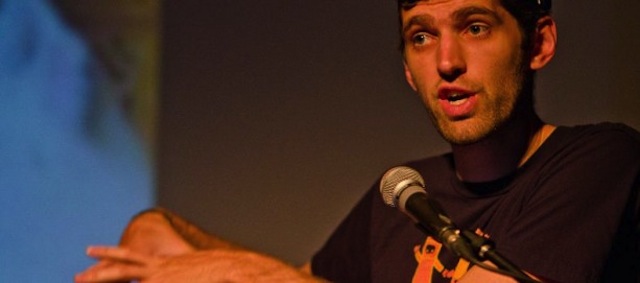Most people have a pretty intuitive understanding of what is and what is not a game. To paraphrase Potter Stewart on hardcore porn, we know it when we see it, and for the vast majority of us, this is basically good enough.
At the most rarified levels of gaming academia, though, people are having a passionate discussion about what, exactly, constitutes a game. This conversation, sometimes fascinating and sometimes comically discursive, found an enthusiastic audience this past Sunday at the NYU Games Center, as three of the brightest minds in the field put their definitions to the test.
Doug Wilson, the reedy and profane creator of JS Joust, made the welcome point that game development is socially constructed. His game involves no screen at all, and in different circumstances it could have been presented as a science project or an art installation. Instead, he promoted and defined his work through the independent game community, and the world received Joust as a game.
For Wilson, games are interactive experiences that attach themselves to gaming cultures, and he was insistent that not all of these experiences be about winning and high scores.
“If Proteus isn’t a game,” Wilson said, referring to Ed Key and David Kanaga’s free-form explorer, “I don’t want to be part of the game development community.”

Annika Waern, a researcher at the Swedish Institute of Computer Science, spoke next, and her motivation in defining games stems from her desire to incorporate her live-action roleplay hobby into the term.
“I want to be able to use photos in my presentations,” she said, “rather than screenshots.”
Waern started with Wittgenstein’s famous idea that there is no set of definitions for “game” that is both necessary and sufficient to incorporate all of the experiences that could be included in the term. She argued, on the contrary, for two simple definitions: that all games have explicit rules, and that a game’s meaning comes from social, cultural and ficitional circumstances and not just its rules.

Above: Matthew Weise, in Mii form.
The final speaker, Matthew Weise from Harmonix and formerly of the Singapore-MIT Game Lab, advocated a more practical solution: “game” can hold multiple meanings, and that’s a good thing. The word means one thing to developers, and another to game academics, and another to the throngs waiting for Black Ops 2. Ultimately, Weise argued, none of these groups have as much power as the culture at large, which will finally set the definition of games. To become obsessed with the semantic thread, he seemed to be arguing, can be as fruitless as having a rigid, Game Informer-approved conception of what a game is and isn’t.
Ultimately, of course, the level of concern over the meaning of games is cyclical, a point that a bearded student reminded the panelists at the close of the talk. Myst, the slow and atmospheric first person puzzler that came out almost twenty years ago, split contemporaneous opinion on the “is it or isn’t it question”. Then the game sold six million copies. The culture spoke.
“No one now,” the student said, “would ever argue that Myst isn’t a game.”
